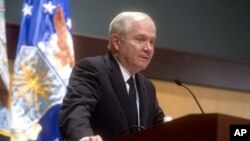With Iraqi politicians still unable to form a government and two U.S. troop withdrawal deadlines looming, American and Iraqi officials are trading comments about the future of the bilateral defense relationship.
Thousands of U.S. combat troops are leaving Iraq every week, as the total American military presence in the country falls rapidly toward the target of 50,000 by the end of this month. Even with the deadline three weeks away, the Pentagon's TV channel noted the formal end of the U.S. combat mission last Saturday.
"The Fourth Brigade of the Second Infantry Division formally handed over security responsibilities to the Sixth Iraqi Army Division on Saturday, the final U.S. combat team to transfer control of combat operations back to the Iraqi military," a newscaster said.
With that, the U.S. military focus in Iraq shifts completely to advising and assisting Iraqi forces. Even the formal name of the mission will change on September first from Operation Iraqi Freedom to Operation New Dawn. And under a U.S.-Iraqi agreement signed in 2008, there will be another withdrawal next year, leaving no U.S. troops in Iraq at all by December 31, 2011.
But ever since that agreement was signed there has been an expectation among experts and U.S. and Iraqi officials that it might well be amended before it is fully implemented.
"No, it's not surprising, but I think we have to put it in perspective," said Michael O'Hanlon of the Brookings Institution, reacting to comments Wednesday by Iraq's senior military officer, Lieutenant General Babakir Zebari. The general said Iraq will need U.S. troops for 10 more years.
"What you could see is this Iraqi general actually trying to put a little pressure on his own country's politicians, and also counter the current assumption that the United States can and should leave by the end of next year," he said.
O'Hanlon says the general is reflecting the views of many Iraqi and American military officers, who he says believe Iraq will need U.S. air power, trainers, Special Forces and other support well beyond the end of next year. And he says there is a broader reason, too.
"Why do you want to run the risk of taking away this good friend of the Iraqi people, and this sort of stabilizing, independent, neutral capability in the form of the United States military, when you're not yet sure all the Iraqi wounds have adequately healed for that country to really be on a path toward stability," asked O'Hanlon.
Those unhealed wounds include disputes between Iraqi Shiites and Sunnis, and between the country's Arab and Kurdish communities. And there is also the prospect that uneven governance and economic development, and a struggling justice system, could create an opportunity for militants to make a comeback. Experts also note Iraq will need to continue professionalizing and modernizing its forces and will need foreign help with those efforts. Some say the most logical source of that help is the United States
But the prospect of a continued U.S. troop presence in Iraq beyond 2011 is a sensitive political issue in both countries. U.S. officials say they are working to implement the full withdrawal plan, but they are open to talking about a change if Iraq's government wants to. U.S. Defense Secretary Robert Gates made that point to reporters on his aircraft during a domestic trip on Wednesday.
"I think we have an agreement with the Iraqis that both governments have agreed to, that we will be out of Iraq at the end of 2011," he said. "If a new government is formed there and they want to talk about beyond 2011, we're obviously open to that discussion. But that initiative will have to come from the Iraqis."
U.S. officials have been urging Iraqi politicians to settle their differences and form a new government to address a variety of important issues, including the troops issue. Iraqi officials have been squabbling since the parliamentary election in March left the two main political blocs with almost equal power.
Experts say the troops issue will not likely be settled until Iraq has a government, and until officials in both countries have a chance to evaluate the performance of Iraqi forces in the new role they are now assuming - responsibility for security throughout their country.
In the meantime, officials in both Baghdad and Washington will offer their thoughts from time to time, in an effort to keep the issue alive and to promote their own views on how it should be resolved.
Related video report by Elizabeth Lee:




